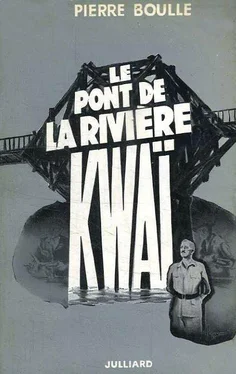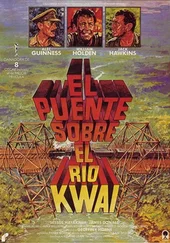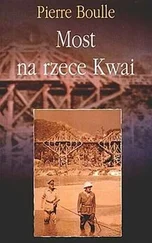Clipton, who once more tried to intervene, also came in for a few blows, and his hospital was cleared of all patients who were still capable of standing upright. They were forced to drag themselves to the building yards and shift heavy loads; otherwise they would have been beaten to death. For several days terror reigned over the River Kwai camp. Colonel Nicholson’s answer to. his ill-treatment was a stubborn, haughty silence.
Saito’s personality seemed to switch from that of a Mister Hyde, capable of every kind of atrocity, to a comparatively humane Doctor Jekyll. Once the period of violence was over, a regime of extraordinary leniency succeeded it. Colonel Nicholson was allowed to draw not only full rations, but also a supplementary scale normally earmarked for the sick list. Clipton was given permission to see him and attend to him, and Saito even warned him that he held him personally responsible for the Colonel’s health.
One evening Saito had the prisoner brought into his room and then dismissed the escort. Alone with him, he asked him to sit down, and drew from his stores a tin of American corned beef, some cigarettes, and a bottle of liqueur whisky. He told him that, as a soldier, he felt a deep admiration for his attitude, but war was war even though neither of them was responsible for it. Surely he could understand that he, Saito, was obliged to obey the orders of his superior officers? Now, these orders stated that the bridge across the River Kwai was to be built as quickly as possible. He was therefore compelled to make use of all the personnel available. The Colonel refused the corned beef, the cigarettes, and the whisky, but listened with interest to what he had to say. He calmly replied that Saito had not the vaguest idea of how to tackle a work of such importance.
He had reverted to his original arguments. It looked as though the argument was likely to go on forever. No one on earth could have told whether Saito was going to discuss the matter sensibly or give vent to another hysterical outburst. He was silent for some time, while the question no doubt was being debated on some supernatural plane unknown to mortals. The Colonel took advantage of this and said:
“May I ask you, Colonel Saito, if you’re satisfied with the work so far?”
The insidious question might well have tipped the scales on the side of hysteria, for the work was progressing badly —which was one of Colonel Saito’s major worries, since his career was at stake as much as his reputation. But this was not the cue for Mister Hyde. He looked foolish, hung his head, and muttered some inaudible reply. Then he put a full glass of whisky into the prisoner’s hand, poured a large one out for himself, and said:
“Look, Colonel Nicholson, I don’t think you’ve really understood. There’s no need for us to be at loggerheads. When I said all the officers were to work, naturally I never meant you, the commanding officer. My orders only applied to the others…”
“Not one of my officers will work,” said the Colonel, putting his glass back on the table.
Saito suppressed a gesture of annoyance and concentrated on keeping calm.
“I’ve been thinking the matter over during the last few days,” he went on. “I think I could put majors and above on administrative duties. Only the junior officers would then have to lend a hand…”
“None of the officers will do any manual labor,” said Colonel Nicholson. “An officer must be in command of his men.”
At this, Saito could control himself no longer. But when the Colonel returned to his cell, having successfully stuck to his guns in spite of bribes, threats, blows, and even entreaties, he felt that the situation was well in hand and that it would not be long before the enemy capitulated.
The work was at a standstill. The Colonel had touched Saito on a raw spot when he asked how the task was progressing, and he was proved right in his forecast that the Japanese would eventually have to yield through sheer necessity.
Three weeks had gone by, and not only was the bridge not yet under way, but the preliminary preparations had been handled so ingeniously by the prisoners that it would take considerable time to repair all the damage that had been done.
Infuriated by the treatment meted out to the C.O., whose courage and endurance they had admired, fretting under the torrent of curses and blows which the sentries rained down on them, indignant at being employed like slaves on work which was useful to the enemy, feeling all at sea now that they were separated from their officers and no longer heard the familiar words of command, the British soldiers competed with each other to see who could be the slackest or, better still, who could commit the most elementary blunders under an ostentatious show of willingness.
There was no punishment sufficiently severe to curb their insidious activities, and the little Japanese engineer was sometimes reduced to tears of desperation. The guards were too spread out to superintend all of them, and too stupid to spot the culprits. The layout of the two stretches of line had had to be started all over again at least twenty times. Both the straight sections and the curves, which had been accurately computed and pegged out by the engineer, would relapse as soon as his back was turned into a maze of disconnected lines diverging at sharp angles, at which he would afterward cry out in despair. The two pieces on either side of the river, which the bridge was eventually meant to connect, were palpably at a different level and never ended up directly opposite each other. One of the squads would then start digging furiously and succeed in producing a sort of crater which dipped far lower than the level required, while the fool of a guard would gaze with delight at the sight of such feverish activity. When the engineer turned up he would lose his temper, and beat guards and prisoners indiscriminately. The former, realizing they had been fooled once again, would take their revenge; but the harm had been done, and it took several hours or several days to repair it.
One squad had been ordered to cut down some trees as timber for the bridge. They would make a careful selection and bring back the most twisted and brittle ones they could find; or else devote considerable effort to felling a giant tree, which would subsequently tumble into the river and be lost. Or again, they would choose trunks which were eaten away inside by insects and collapsed under the slightest weight.
Saito, who carried out a daily inspection, gave vent to his fury in increasingly stormy outbursts of temper. He dispensed curses, threats, and blows, swearing even at the engineer, who would answer back with the retort that the fatigue parties were absolutely useless. At which Saito would scream and swear louder than ever and try to think of a new form of punishment to put an end to this sullen resistance. He made the prisoners suffer more than if he had been an embittered jailer left to his own devices and scared stiff of being fired for inefficiency. Those who were caught red-handed in an act of willful damage or sabotage were tied to trees, beaten with thorn branches, and left out in the open for hours, bleeding and naked, exposed to the ants and the tropical sun. Clipton saw the victims as they came back in the evening; they were carried in by their pals, shaking with fever, their backs stripped raw. He was not even allowed to keep them on the sick list for long. Saito did not forget who they were. As soon as they were capable of standing, he sent them back to work and ordered the guards to keep a special eye on them.
The moral fiber shown by these ‘badhats’ was so moving that Clipton sometimes found himself in tears. He was amazed to see them take such punishment. There was always at least one of them who, when he was alone with him, would find the strength to sit up with a cheerful grin and whisper a few words in a language that was gradually gaining currency among all the prisoners in Burma and Siam:
Читать дальше











